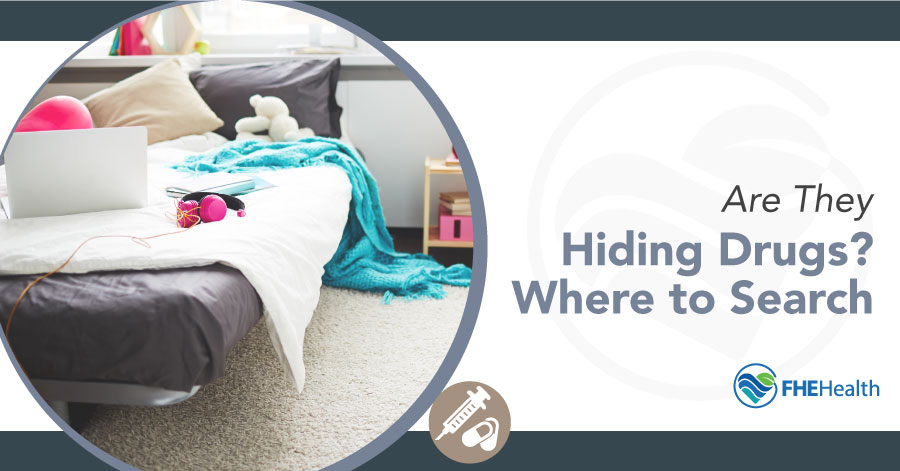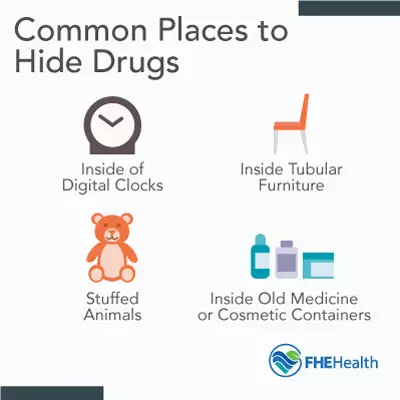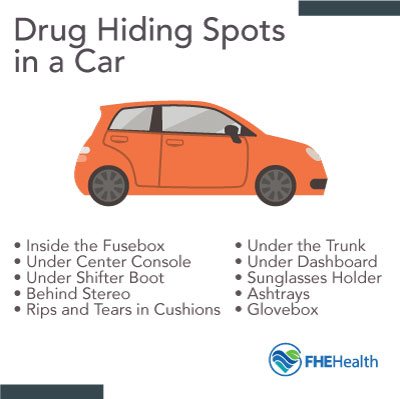
|
|
Are you worried that a friend, family member, or loved one is using drugs? Do you have a son or daughter who is hiding drugs in their bedroom, the backyard, or even in their school locker?
With drug overdoses claiming over 60,000 lives across America in 2016, you have every reason to be concerned if you have a teen hiding drugs. Here’s what you need to know about searching for hidden drugs, including the most common ‘stash’ spots, where to look first, and what to do if you discover your child hiding drugs.
Are They Hiding Drugs? Here Are Some Common Places To Look
 According to the United States Drug Enforcement Administration (DEA), some of the most common drug hiding spots in the home include inside the battery compartment of digital alarm clocks, inside the caps of highlighter markers, and even inside heating vents and behind posters.
According to the United States Drug Enforcement Administration (DEA), some of the most common drug hiding spots in the home include inside the battery compartment of digital alarm clocks, inside the caps of highlighter markers, and even inside heating vents and behind posters.
The DEA also suggests that when searching for hidden drugs you should reach inside of your child’s sneakers since teens have been known to shove small baggies containing drugs up into the toe compartment. Other spots that the DEA recommends looking include candy containers, inside of electronic game consoles and controllers, and even along the seams of your child’s favorite stuffed animal.
While this list from the DEA gives you the basics of where to start looking for drugs that your son or daughter may have stashed somewhere in their bedroom. However, the fact is that your teens have probably already read this list online – that means you’ll have to dig a little deeper to discover the lesser-known places where you should be searching for hidden drugs.
Top 10 Best Hiding Places for Drugs
Individuals who really want to hide their addiction find the strangest and most secretive places to hide drugs at home. Some of the spots you may not have considered looking for hidden drugs are:
- Books: You wouldn’t think twice about seeing someone with a book. That’s exactly why books make an excellent place to hide drugs. People can tape the drugs between the book cover and the book itself. Or, they can carve out the pages of the book to create a little storage space.
- Flashlights: Someone can quickly empty the batteries in a flashlight and create a little drug container. Almost everyone has a flashlight at home, so it wouldn’t occur to most people to search inside this everyday household item.
- Tampon boxes: Female sanitary products are private, so naturally this isn’t an item you’d go searching through regularly. However, an addict may know this and take advantage of the box holding tampons, sanitary pads and other female products as a hiding spot. A small package of weed, pills or powder can be stashed very easily at the bottom of a tampon box.
- Hairbrush: Almost every person owns a hairbrush. Most hairbrushes are designed with a somewhat thick, hollow handle. Check the bottom of the hairbrush handle to see if it seems loose and has been popped off.
- Picture and art frames: Always check behind and around the frames of artwork or pictures in your home. Someone can hide a small bag of drugs behind a piece of wall decor.
- Toilet tank: Most people clean inside their toilet bowl and on the floor around the toilet but don’t pay much attention to their toilet tank. A popular way to hide drugs is to tape a bag to the back or underside of a toilet tank.
- Belt buckle: The back of a large belt buckle can used as a mini storage space for drugs. Always inspect belt buckles thoroughly.
- Toys: Nothing looks more innocent than a toy. However, many toys offer opportunities for storage. This is especially true for toys that have battery compartments.
- Wallet: One of the most convenient spots of all is a person’s wallet. This allows the individual to keep their drugs close by at all times. Try to look through the person’s wallet when they’re taking a shower or have set their wallet aside for a few minutes.
- Shed: Drugs don’t have to be stashed inside the house or car. A shed, treehouse, garage or other type of storage space can make an excellent drug hiding spot. Take note of whether the individual you suspect of hiding drugs visits one of these areas on your property frequently, seemingly without purpose.
Is Your Teen Hiding Drugs? Secret ‘Stash Spots’ That Might Surprise You
Here at FHE Health, our team of addiction specialists has worked with substance abusers of all ages, including young adults who use everything from marijuana to prescription pills, heroin, and poppers. We know that if you have a child hiding drugs, chances are good they’ll put a lot of effort into making sure their stash isn’t anywhere that you might expect to find it.
Some of the more creative places where you should look if you think you have a son or daughter hiding drugs include any type of bottle – that means shampoo bottles, vitamin bottles, and hair care products since these are commonly found in any young persons’ bedroom, bathroom, or school locker. The same goes for makeup containers like lipstick tubes, deodorant, and body wash as well.
Holes in mattresses, box springs, and pillows also make for popular hiding spots, as do reusable water bottles and coffee mugs. In fact, there’s a number of online companies that sell small safes that are designed to look and feel just like common household items like dictionaries, pop cans, and candy boxes, so if you notice a container that seems a little suspicious, check it out.
If your teen is involved in sports, take a good look in their gym bag. Some drug users store their stash inside of old baseball gloves, stuffed down used sports socks, and yes, even inside of jock straps – this is in an effort to use the ‘gym locker smell’ to conceal the odor of strong-smelling drugs like marijuana.
Where To Search For Hidden Drugs Outside The Home
 A teen who is hiding drugs might decide it’s safer to stash their substances somewhere outside the home since this might make it tough for you and the authorities to actually connect your child to the drugs.
A teen who is hiding drugs might decide it’s safer to stash their substances somewhere outside the home since this might make it tough for you and the authorities to actually connect your child to the drugs.
Look around your yard for places where drugs could be hidden, such as covered electrical outlets, inside of the recycling bin, or in your garden planters. If you’ve noticed your teen suddenly taking an interest in their childhood playhouse, you should take the time to inspect the area for hidden drugs.
It’s also common for youth who are using drugs to conceal items on their route to and from school in places like parking lots, playgrounds, and neighboring properties.
Don’t Forget To Check The Family Car, Van, or Truck
According to an article in Psychology Today, “cars are one of the most common places for teens to hide drugs“. Even if your child isn’t yet driving, it’s important to be aware of the many secret spaces inside your family car that could easily conceal a baggie of marijuana, a packet of pills, or even a fairly large stash of illegal substances.
Drugs can easily be stuffed between seat cushions or deep inside those storage pouches that are often found on the seatbacks, while your teens can quickly lift up the floor mats, toss something underneath, and cover it back up.
If your teen has some time alone with your vehicle, they may also hide drugs inside of the compartments where the tire jack is stored, below the spare wheel, or they might even lift out the cup holders to create a hidden stash spot. Drugs can also be stuffed inside the engine compartment next to the washer fluid reservoir, or behind the glove box in the area where the cabin air filter can be found.
What to Do if You Find Someone Hiding Drugs
If you find out your loved one is hiding drugs, it’s essential to approach the situation with a calm and understanding state of mind. Addiction is a disease, but it can be treated with professional help and programs. Make a plan of how to approach your loved one about what you found. Ask them to open up to you about their drug use and suggest treatment options. Remind them that you love them and know they can get better.
Need Help? We’re Here For You
Remember, when you’re searching for hidden drugs you should also keep an eye out for drug paraphernalia as well. This can include things like tobacco rolling papers, small scraps of tin foil, empty toilet paper rolls, and ballpoint pens that have had the ink cartridge removed since all of these items can be used to inhale drugs. Things like razor blades, lighters, and rolled-up bills are also red flags that your child is hiding drugs.
And if you’ve found out that your teen is hiding drugs, don’t panic – reach out for help. Drug abuse and addiction is a complex issue that impacts everyone in your family, and the sooner you seek support, the better.
Contact us today by calling us at (833) 596-3502. Our compassionate team of professional drug counselors is standing by to take your call 24/7. We provide science-based, cutting-edge treatment therapies that are designed to effectively treat addiction.






